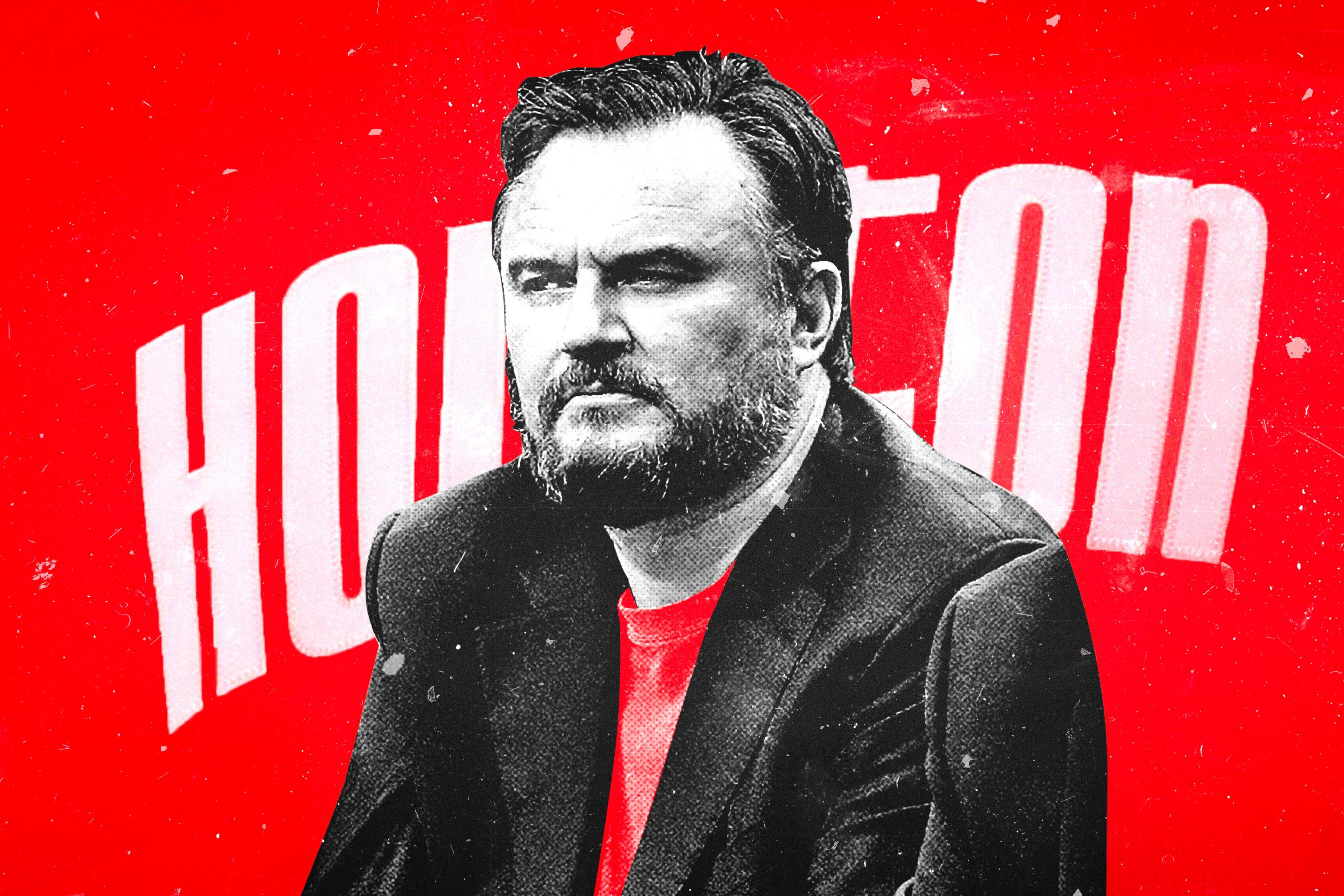
The ground is shaking beneath the Toyota Center. One month ago, Mike D’Antoni—the Rockets’ head coach for the past four seasons—informed players and staff that he would be leaving the organization. As Houston carries out the search for his replacement, Daryl Morey—the team’s general manager since 2007—has also decided to step down as the head of Houston’s basketball operations, according to a report from ESPN’s Adrian Wojnarowski. One of the most reliably competitive franchises in the NBA suddenly has become destabilized; the players who determine whether the Rockets win or lose may still be on the roster, but the two individuals most responsible for how that roster came together and the unorthodox form it took on the court are moving on.
Morey’s exit, like D’Antoni’s, has been characterized as a decision made on his own terms. This can be only partly true, considering the way individual agency in pro sports is always a product of circumstance. D’Antoni did choose to make a change—but only after multiple failed rounds of extension talks the previous offseason, during which Tilman Fertitta, the sole governor of the Rockets, said that D’Antoni’s agent “did [him] a favor” by making it less expensive to fire the coach if the season didn’t go according to plan. Rumors of D’Antoni’s status (and potential destination, should he be let go) floated around the NBA for months. In the wake of Houston’s eventual playoff elimination, D’Antoni reportedly met with Morey to debrief the season, as he had with the majority of the Rockets’ players and staff. He expected a call from Fertitta to discuss his future with the team, but it never came. Making the choice to leave was a claim to a certain dignity.
Morey surely has his own reasons to leave his post, some personal (Wojnarowski cites the unique opportunity for the former GM to spend more time with his children, who are taking a pandemic gap year from their undergraduate studies) and some professional. Even the most flexible rosters can feel like a burden when they’re forced to limbo under the luxury-tax line every season. But if he never works in basketball again, Morey will still leave an indelible legacy in the state of play. The last decade of NBA strategy could be explained by the league’s pursuit of the Rockets and their ideal shot chart: a golden ratio of 3s, layups, and drawn fouls. As other teams caught on to those competitive advantages, taking more 3s with every passing season, Morey pushed his team toward new extremes. Basketball executives tend to make conservative decisions—the kind more easily explained, and thus less likely to get them fired. Even when he made mistakes, Morey always proceeded boldly, his every move a reminder that urgency is a prerequisite to winning.
“To be the best of 30, you constantly have to keep improving,” he told me this past season. “Because no one else is staying still.”
Houston never won the championship or even made it to the Finals during Morey’s lengthy tenure. But while he was in charge, the Rockets won more of their games than every team but the Spurs. They won so much that Morey continued in his position even after sending a tweet in support of democratic protests in Hong Kong that imperiled the Rockets’ bottom line and the NBA’s business dealings in China. “Is he still working for you?” Donald Trump asked Fertitta in the aftermath. “He must be pretty good.” Houston made it to the second round of the playoffs or better in about half of its seasons under Morey. The franchise glided from Yao Ming and Tracy McGrady to James Harden and Russell Westbrook, sustaining success by welcoming change. This is the end of an era—one that could have unfolded so differently if not for an inconvenient bit of muscle tissue stretching too far at the worst possible time.
The Rockets wouldn’t be here—without a coach, without a general manager, and without an anchor—if not for the most ill-fated minute in their history. There were 57.6 seconds remaining when Chris Paul went to make his move against Quinn Cook in Game 5 of the 2018 Western Conference finals, and 53.5 seconds remaining when Paul fell to the ground, clutching the back of his right leg. He left the game with a hamstring injury but the Rockets pulled out a win, taking a 3-2 series lead that pushed the Warriors to the brink of elimination for the first—and only—time with Kevin Durant in the lineup. “I will be all right,” Paul told Marc Spears of The Undefeated after the game. He wasn’t, and Houston was never the same.
That moment may have changed the course of modern NBA history. It led a 65-win team down the road to infamy, better remembered for missing 27 straight 3-pointers than putting together one of the most dominant seasons of the 21st century. It would eventually confirm the Warriors as a dynasty, clearing their path to the 2018 title and cementing their reputation—strangely enough—as one of the most unbeatable teams of all time. Houston could have won the title that season. But without the salve of championship validation, the reportedly fraying relationship between Paul and Harden became an open wound.
As a result, Houston traded not only Paul to Oklahoma City for Russell Westbrook, but also first-round picks in 2024 and 2026 and pick swaps in 2021 and 2025. The fallout from that single, disastrous minute has made the Thunder (who pulled in a similar haul while trading Paul George to the Clippers) one of the most asset-rich teams in the league, and one that was competitive enough in the interim with Paul to nearly bounce the Rockets from the first round of the 2020 playoffs. At some point, OKC will possibly redeem even more value by trading Paul to a playoff contender, where he could again shape the championship picture.
On its face, trading Paul for Westbrook was a clear deviation from the way Morey and the Rockets had done business for more than a decade. It will go down as a strange coda on his Houston career. Through that exchange of Hall of Fame point guards, the Rockets took on the $132.6 million that Westbrook is owed over the next three seasons, creating a spacing problem to solve on the court while trapping the roster in salary gridlock. Flipping Clint Capela for Robert Covington—and the adventure of full-time small ball—was an attempt to clear the floor that Westbrook had cluttered. “That’s why we did it,” D’Antoni said in July. “To maximize him.” It was a worthy experiment. But by conducting it, the Rockets committed to a style without committing to the coach who could make sense of it. Now that coach is gone, as is the general manager who made that radical trade along with him.
Rafael Stone, the Rockets’ general counsel turned executive vice president of basketball operations, will reportedly step into Morey’s former role. The search for Houston’s next coach will continue, perhaps with a turn toward Jeff Van Gundy, a former coach of the team, Houston resident, and presumptive favorite. Harden’s presence alone amounts to a playoff guarantee; there is no clearer path to 50 wins in the NBA than to give him the ball and get out of his way. But considering how little room the Rockets have to improve or even adjust their roster, Morey’s departure seems like a precursor in and of itself, a moment we trace back to when a frustrated Harden someday requests to be traded. It would be yet another hamstrung butterfly effect from 2018: Harden moving on to change another franchise, just as he did the Rockets.
Morey was the executive who brought Harden to Houston in the first place, who saw astonishing potential in the reigning Sixth Man of the Year. Soon after, Harden became one of the best offensive players in basketball. The trade itself was an investment in the Rockets’ future—the opportunity the team had been waiting for, and the reason to keep all its assets in a row. It was a move years in the making. As Morey saw it, the work of a general manager was a devotion to something larger than any one game or any one season. “We’re the last people who worry about the long term of the franchise,” he told me. Here now, at the end of his run in Houston, it’s amazing how much of that long term comes back to that single game, that single minute, when everything started to come apart.

